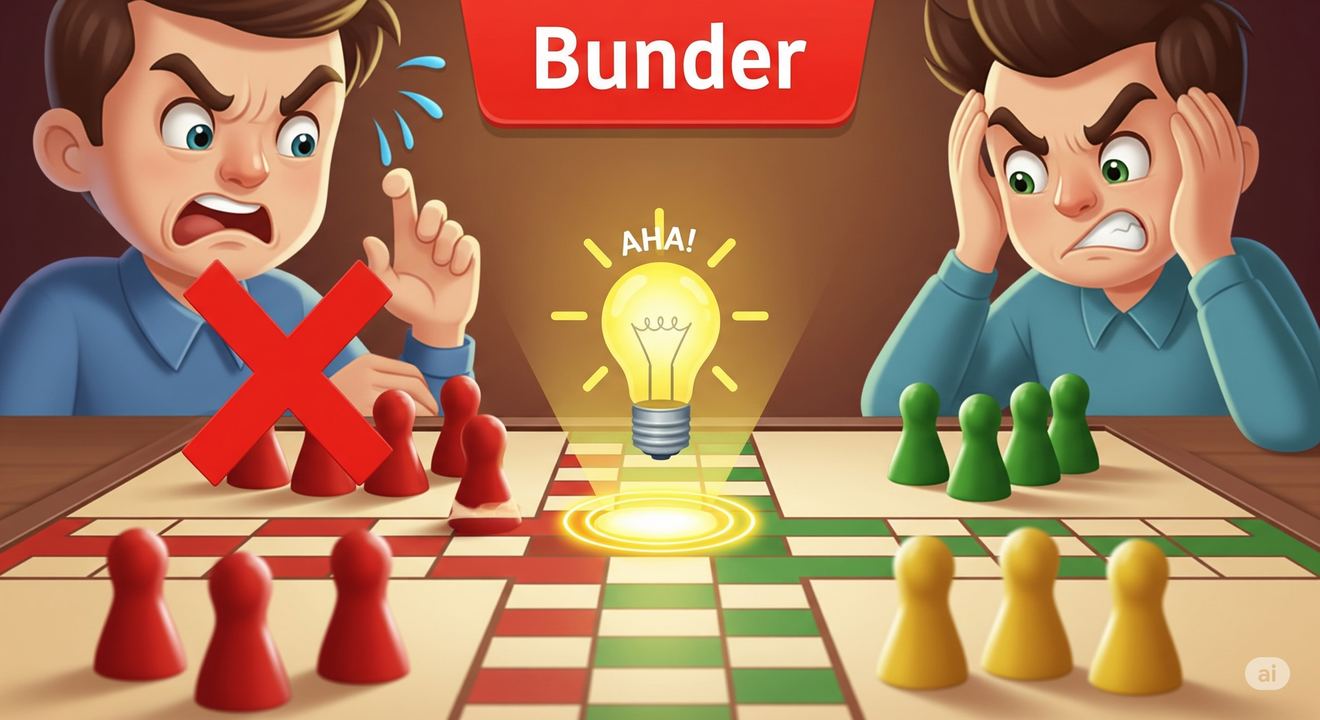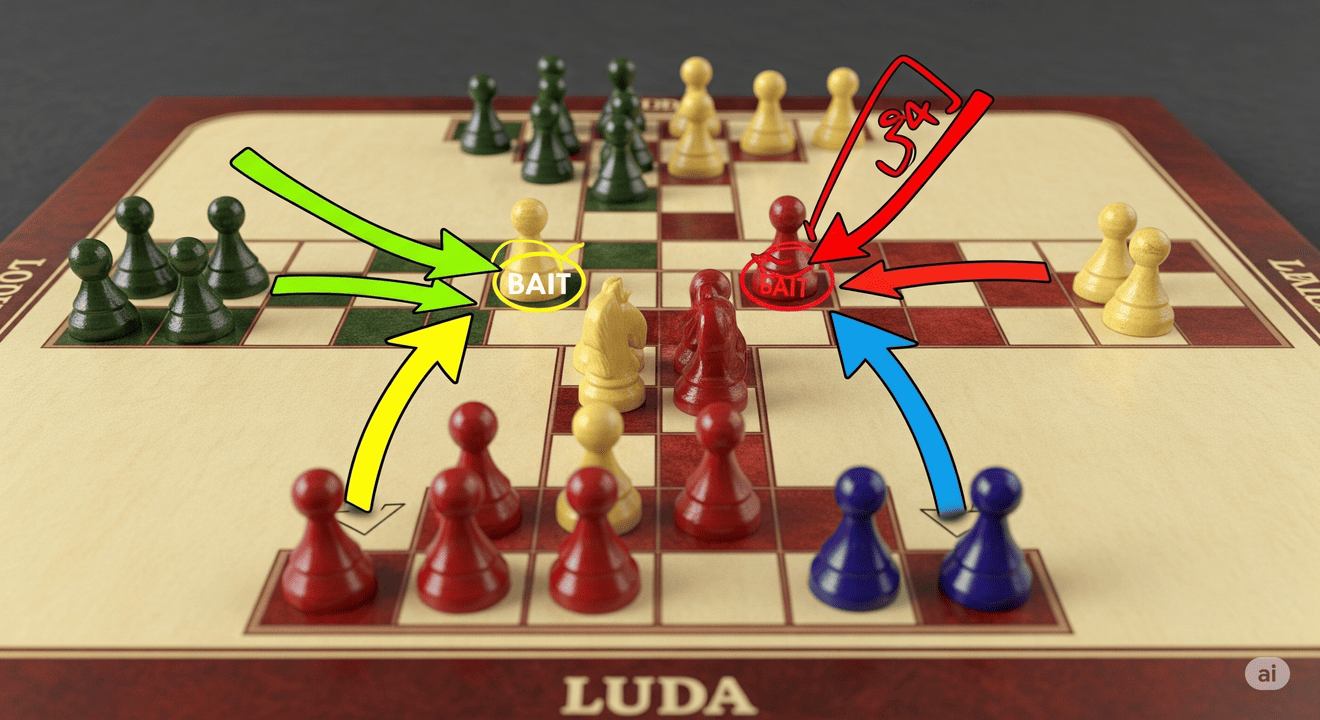5 Common Ludo Mistakes That Cost You the Game (And How to Fix Them)
We’ve all been there. You’re in a heated match on Ludo Supreme Gold. You have a pawn just a few steps from home, victory is within your grasp… and suddenly, everything falls apart. An opponent’s lucky roll sends your pawn back to the start, and the game slips through your fingers. It’s easy to blame bad luck, but more often than not, consistent losses are a result of small, repeated strategic errors.
The difference between amateur players and the champions on our leaderboards isn’t luck; it’s the ability to avoid common pitfalls. The good news is that these mistakes are easy to fix once you become aware of them. This guide is here to act as your personal Ludo coach. We will shine a light on the five most common Ludo mistakes and give you the simple fixes needed to turn frustrating losses into consistent, satisfying wins.
Mistake #1: Keeping Your Pawns (Goti) Trapped at Home
This is perhaps the most frequent error we see among new players. They play with fear. They roll a six, a powerful and valuable number, but instead of using it to bring a new pawn (or goti) into play, they cautiously move a pawn that’s already on the board. They keep their other three pawns locked away in the starting yard, waiting for the “perfect” safe moment that never comes.
Why It’s a Devastating Mistake
Playing this passively is a recipe for disaster. By keeping your pawns at home, you:
- Limit Your Options: With only one pawn on the board, you have no choice in your moves. If a roll puts that single pawn in danger, you have no other option but to walk into the trap.
- Surrender Board Control: You can’t threaten opponents or control space if your army is stuck in the barracks. You become a non-factor in the game until it’s often too late.
- Waste Your Best Rolls: A six is your ticket to bringing a new piece into the game and putting pressure on your opponents. Using it for a simple move is a waste of its true potential.
The Simple Fix: Prioritize Liberation
Change your mindset. Your first priority when you roll a six should almost always be to liberate a pawn from your home yard. This is the direct opposite of playing timidly and aligns with the expert advice in our 7 Unbeatable Ludo Tricks guide. Having more pawns on the board gives you flexibility, control, and a significantly higher chance of winning. Get your pieces in the game!
Mistake #2: Chasing an Opponent Recklessly (Ignoring Your Own Safety)
You see an opponent’s pawn just a few steps ahead. The temptation is overwhelming. You develop tunnel vision, and every roll becomes about one thing: capturing that single piece. This is “Ludo bloodlust,” and it’s a critical mistake that stems from emotion, not strategy. In your reckless pursuit, you fail to notice another opponent’s pawn sneaking up behind you, ready to capture your far more valuable, advanced piece.
Why It’s a Losing Strategy
Chasing without thinking is a bad trade. You might risk your pawn that is 70% of the way home just to capture an opponent’s pawn that has barely left its starting area. If you succeed, your gain is minimal. If you fail and get captured, your loss is catastrophic. It’s a classic case of winning the battle but losing the war.
The Simple Fix: Use Calculated Aggression
Before you chase, pause for two seconds and assess the risk versus the reward. Ask yourself these questions:
- Is the pawn I’m using to chase in danger from another player?
- Is the pawn I’m chasing more advanced or valuable than my own?
- Would it be wiser to use this roll to move another one of my pawns into a safe “star” zone or closer to home?
Aggression is a powerful tool, but only when it’s smart. Don’t let your emotions drive your decisions. Play the board, not your feelings.
Mistake #3: Bunching All Your Pawns Together
Many players fall into the trap of moving their pawns in a tight little cluster. They believe there’s safety in numbers, like a small, mobile fortress. In reality, this is one of the riskiest ludo strategy errors you can make. You are putting all of your eggs in one basket.
Why It’s a Critical Flaw
Imagine your four pawns are all within 1-6 spaces of each other. Now, imagine an opponent lands right in the middle of them. With one lucky roll, they could potentially send two or even three of your pawns back home. It’s a devastating, game-ending blow. Furthermore, when your pawns are bunched, you limit your own options. A roll of ‘5’ might be a great move for one pawn but a terrible, suicidal move for another, yet they are all stuck in the same area.
The Simple Fix: Diversify and Conquer
Spread your pawns out! A winning player controls the entire board. Think of your pawns as a squad with different roles.
- Have one “runner” pawn focused on getting home.
- Keep one “defender” pawn in your first quadrant to hinder opponents starting out.
- Position one or two “hunter” pawns in the middle of the board to be a threat to everyone.
By distributing your pawns, you distribute your risk and maximize your strategic options with every roll.
Mistake #4: Ignoring the Power of a Blockade
This is a mistake of omission. A player has the opportunity to land two of their pawns on the same square to form a powerful block, but they don’t see the value. Instead, they just use the roll to move a single pawn a few steps forward. They are playing a one-dimensional game, only thinking about running, not about controlling space.
Why It’s a Huge Missed Opportunity
A blockade is one of the strongest strategic moves in Ludo. It creates a wall that no single opponent pawn can pass. By failing to use blockades, you are giving up the chance to:
- Completely trap an opponent’s most advanced pawn.
- Create an impenetrable safe zone for yourself.
- Build a defensive wall to protect your own pawns as they run for home.
The Simple Fix: Actively Hunt for Blockade Opportunities
Start thinking of the board like a game of chess. Controlling key squares is vital. Before you move, scan the board and ask, “Can this roll allow me to create a block?” If you can form a block in a strategic location—like right in front of an opponent’s home entry or on a star square—it is often the best move you can possibly make.
Mistake #5: Playing on “Autopilot” and Not Adapting
This is the silent killer of Ludo success. The player is not truly engaged. They roll the dice, glance at the board, and make the most obvious move without any real thought. They are on “autopilot,” using the same basic strategy regardless of how the game is unfolding. They don’t react to an opponent’s aggressive positioning or notice a sudden opportunity to capture a valuable piece.
Why This Guarantees Mediocrity
Ludo is a dynamic game. The best move is constantly changing based on the positions of all 16 pawns on the board. Playing on autopilot is like trying to navigate Jakarta’s traffic while looking only at your own car. You’ll miss everything happening around you and inevitably get stuck or, worse, crash.
The Simple Fix: Be an Active, Engaged Player
Before every single roll, take five seconds to do a full scan of the board.
- Where is my biggest threat?
- What is my best opportunity?
- What is my opponent likely trying to do?
This simple habit of active engagement will elevate your gameplay instantly. The top players on Ludo Supreme Gold win because they are fully invested in the strategic landscape of every single turn.
Conclusion: Turning Mistakes into Masterstrokes
Losing a game of Ludo is part of the experience, but losing because of repeatable mistakes doesn’t have to be. By becoming aware of these five common pitfalls—playing too timidly, chasing recklessly, bunching up, ignoring blocks, and playing on autopilot—you can consciously correct your gameplay.
Every mistake you eliminate is another step towards becoming a formidable opponent. Now, it’s time to put this knowledge into practice.
Open up Ludo Supreme Gold, start a new game, and play with a new level of awareness. You’ll be surprised how quickly your results improve!





Post Comment